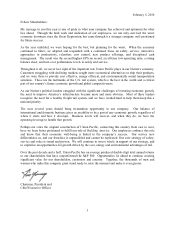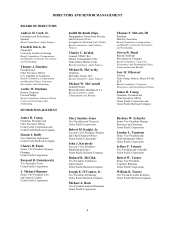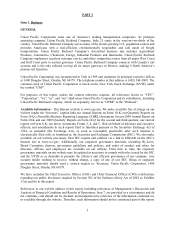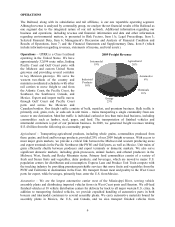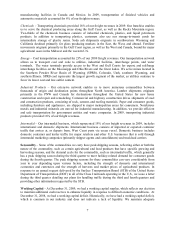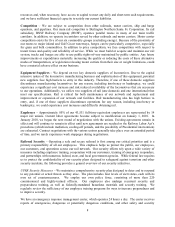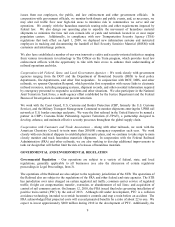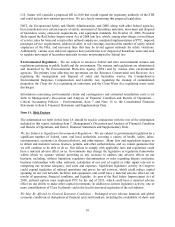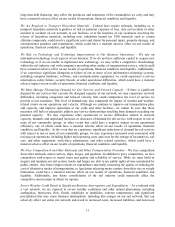Union Pacific 2009 Annual Report Download - page 13
Download and view the complete annual report
Please find page 13 of the 2009 Union Pacific annual report below. You can navigate through the pages in the report by either clicking on the pages listed below, or by using the keyword search tool below to find specific information within the annual report.13
increased costs related to defending and resolving legal claims and other litigation related to climate
change and the alleged impact of our operations on climate change. Any of these factors, individually or
in operation with one or more of the other factors, or other unforeseen impacts of climate change could
reduce the amount of traffic we handle and have a material adverse effect on our results of operations,
financial condition, and liquidity.
Rising or Elevated Fuel Costs and Whether We Are Able to Mitigate These Costs with Fuel Surcharges
Could Materially and Adversely Affect Our Business – Fuel costs constitute a significant portion of our
transportation expenses. Diesel fuel prices are subject to dramatic fluctuations, and significant price
increases could have a material adverse effect on our operating results. Although we currently are able to
recover a significant amount of our increased fuel expenses through revenue from fuel surcharges, we
cannot be certain that we will always be able to mitigate rising or elevated fuel costs through surcharges.
Future market conditions or legislative or regulatory activities could adversely affect our ability to apply
fuel surcharges or adequately recover increased fuel costs through fuel surcharges. International, political,
and economic circumstances affect fuel prices and supplies. Weather can also affect fuel supplies and
limit domestic refining capacity. If a fuel supply shortage were to arise, higher fuel prices could, despite
our fuel surcharge programs, have a material adverse effect on our results of operations, financial
condition, and liquidity.
We Utilize Capital Markets – Due to the significant capital expenditures required to operate a safe and
efficient railroad, we rely on the capital markets to provide some of our capital requirements. We utilize
long-term debt instruments, bank financing and commercial paper from time-to-time, and we pledge
certain of our receivables. Significant instability or disruptions of the capital markets, including the credit
markets, or deterioration of our financial condition due to internal or external factors could restrict or
prohibit our access to, and significantly increase the cost of, commercial paper and other financing
sources, including bank credit facilities and the issuance of long-term debt, including corporate bonds. A
deterioration of our financial condition could result in a reduction of our credit rating to below investment
grade, which could prohibit or restrict us from utilizing our current sale of receivables program or
accessing external sources of short- and long-term debt financing and significantly increase the costs
associated with utilizing a sale of receivables program and issuing both commercial paper and long-term
debt.
We Are Subject to Legislative, Regulatory, and Legal Developments Involving Taxes – Taxes are a
significant part of our expenses. We are subject to U.S. federal, state, and foreign income, payroll,
property, sales and use, fuel, and other types of taxes. Changes in tax rates, enactment of new tax laws,
revisions of tax regulations, and claims or litigation with taxing authorities could result in substantially
higher taxes and, therefore, could have a material adverse effect on our results of operations, financial
condition, and liquidity.
The Availability of Qualified Personnel Could Adversely Affect Our Operations – Changes in
demographics, training requirements, and the availability of qualified personnel could negatively affect
our ability to meet demand for rail service. Unpredictable increases in demand for rail services and a lack
of network fluidity may exacerbate such risks, which could have a negative impact on our operational
efficiency and otherwise have a material adverse effect on our results of operations, financial condition,
and liquidity.
We Are Dependent on Certain Key Suppliers of Locomotives and Rail – Due to the capital intensive
nature and sophistication of locomotive equipment, potential new suppliers face high barriers to entry
with respect to locomotive manufacturing. Therefore, if one of these domestic suppliers discontinues
manufacturing locomotives for any reason, including bankruptcy or insolvency, we could experience
significant cost increases and reduced availability of the locomotives that are necessary to our operations.
Additionally, we utilize two suppliers of rail that meet our specifications. Rail is critical to our operations
for rail replacement programs, maintenance, and for adding additional network capacity, new rail and


